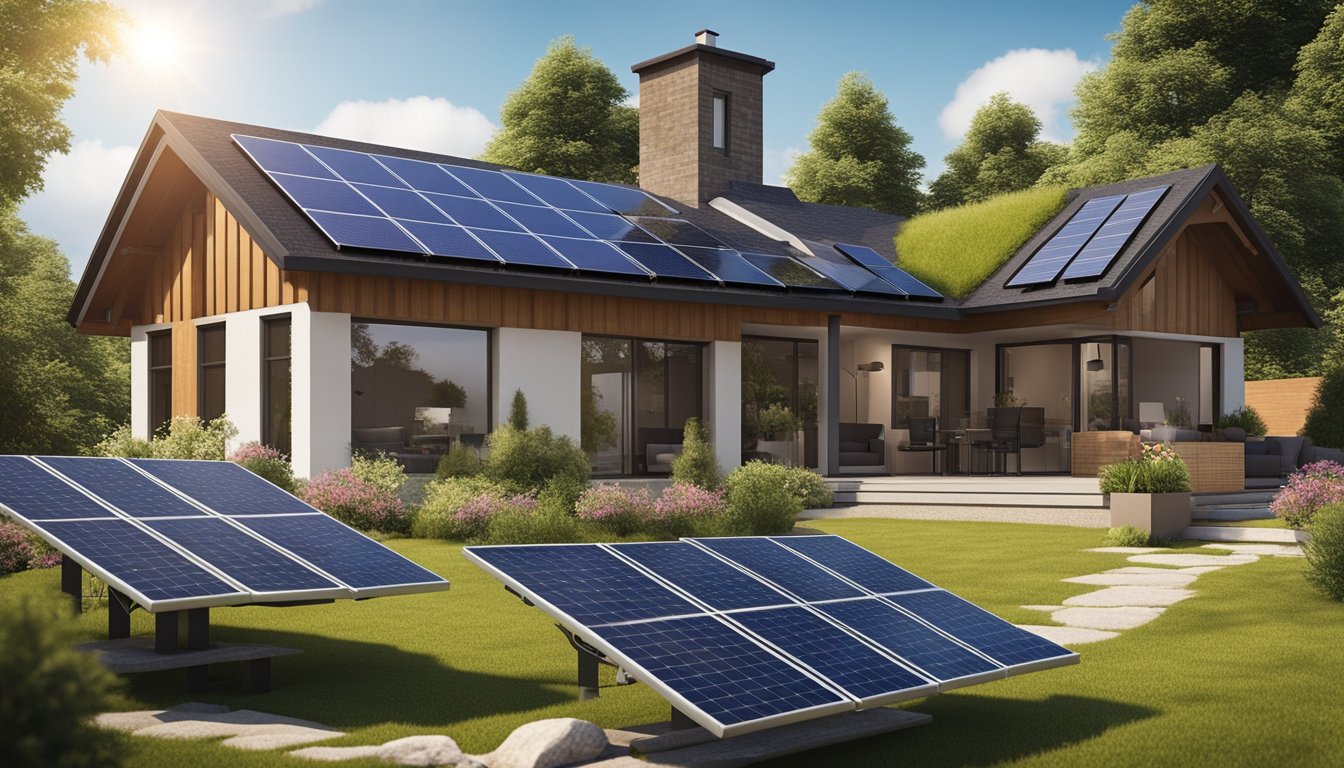Late updated: 04 Oct 2024 11:10
Written by: Eleanor Hartman
Renewable Energy Grants For UK Homeowners: Unlocking Sustainable Savings
In today's world, renewable energy isn't just a trend—it's a pivotal piece of our sustainable future. For UK homeowners, understanding the available grants can significantly lessen the financial burden of making these eco-friendly transitions. These grants can help homeowners access energy efficiency measures and low-carbon heating options, transforming their homes into environmentally friendly havens while reducing utility expenses.

Let's explore the types of assistance available. Several programmes provide financial support for installing solar panels, heat pumps, and other renewable technologies. Knowing where and how to find these subsidies can be the first step towards maximising energy savings in your residence. By leveraging schemes like the ECO4 grant and the Smart Export Guarantee, homeowners can not only contribute to environmental conservation but also enhance their property value.
These opportunities are diverse and tailored, enabling households to optimise their energy consumption throughout different regions of the UK. Engaging with available resources doesn't just support personal energy efficiency goals—it aligns us with broader national targets for reducing carbon footprints. By working together, we can make meaningful changes for ourselves and future generations.
Key Takeaways
- Grants can reduce costs of renewable energy installations.
- Support is available for technologies like solar panels and heat pumps.
- Energy efficiency increases home value and reduces utility bills.
Understanding Renewable Energy Grants for UK Homeowners
Renewable energy grants in the UK provide homeowners with financial assistance to implement energy efficiency improvements. These initiatives help promote sustainable living and reduce energy costs by facilitating the adoption of renewable technologies.
Types of Renewable Energy Grants Available
There are several grants available that aim to enhance energy efficiency and support renewable energy use in homes. The ECO4 Grant, one option, offers substantial funding for fuel-poor households or those on benefits to invest in energy-efficient solutions. This grant aids in the installation of alternatives like solar panels and improved insulation. Additionally, initiatives like the Home Upgrade Grant focus on low-income households, promoting the adoption of energy-saving measures and low carbon heating solutions.
Other notable programmes include the Renewable Heat Incentive, which encourages the use of renewable heat technologies by providing ongoing financial incentives. Some local councils and energy suppliers also provide regional grants or flexibility schemes, such as ECO4 Flex, to assist more households. Through these diverse options, UK homeowners can access significant support in their transition to more sustainable energy systems.
Eligibility Criteria for Grant Schemes
Eligibility for these grants often depends on several factors. Many schemes, like the ECO4 Grant, specifically target households experiencing fuel poverty, or those receiving certain benefits. For instance, eligibility might require the household to meet income criteria or to reside in homes with poor energy efficiency ratings.
Some grants may also stipulate that applicants live in specific regions or that the property falls under a certain size or type. Furthermore, proof of benefits or income status might be necessary to verify eligibility. It's important for applicants to thoroughly review the specific requirements of each grant to ensure they meet the criteria before applying.
Applying for Energy Efficiency Incentives
The application process for renewable energy grants can involve several steps and may vary depending on the scheme. Generally, homeowners need to contact the relevant authority or programme provider. They may have the option to apply online or via a phone call. Some schemes require an initial energy assessment or survey of the property to tailor the improvements needed.
It's advisable to gather all necessary documentation, such as proof of benefits or income, prior to starting the application. In some cases, working with registered installers who often assist with the application process can be beneficial. Following these steps can streamline the application process, making it easier for homeowners to benefit from available grants and incentives.
Maximising Energy Savings in Your Home

By investing in improvements, such as enhanced insulation and renewable energy technologies, homeowners in the UK can make significant energy savings. These changes not only lower electricity and energy bills but also provide lasting benefits.
Upgrading Home Insulation
Improving insulation can dramatically reduce heat loss and enhance your home's energy efficiency. Loft insulation and cavity wall insulation are excellent starting points, as they're often responsible for a major percentage of heat retention issues. Draught-proofing is another cost-effective method, sealing any gaps around windows and doors to prevent cold air from entering and warm air from escaping.
Double glazing offers an additional layer of protection against heat loss. This upgrade not only makes your home more comfortable but also helps cut down on energy bills. Efficient insulation ensures the warmth stays inside during the colder months, leading to noticeable savings.
Investing in Renewable Energy Technologies
Transitioning to renewable energy technologies can significantly decrease reliance on traditional power sources. Solar panels are a popular choice for generating clean energy, turning sunlight into electricity for our homes. While the initial investment might be substantial, long-term savings on electricity bills make it worthwhile.
Another option is installing a heat pump, which is effective at providing energy-efficient heating. Heat pumps transfer thermal energy from one location to another, and while they require electricity, their efficiency means they use significantly less compared to conventional heating systems. These technologies not only reduce costs but also contribute to a more sustainable future.
Long-term Benefits of Energy Efficient Improvements
Investing in energy-efficient home improvements pays off in several ways. Most importantly, it reduces energy bills, helping us save money each month. Energy efficiency also increases property value, as buyers are often willing to pay a premium for homes with lower ongoing costs.
Environmental benefits are another advantage. By using resources like solar panels and heat pumps, we reduce our carbon footprint and contribute to a healthier planet. These improvements ensure our homes are not only more economical but also aligned with our growing need for eco-friendly living.
Frequently Asked Questions

We address some of the common concerns regarding renewable energy grants available to UK homeowners. These questions focus on application processes, eligibility, and specific project funding options.
How can UK homeowners apply for renewable energy grants?
UK homeowners can apply for renewable energy grants through government websites or authorised schemes. Necessary forms and detailed guidance are often provided to help applicants meet any specified requirements.
What criteria must be met to qualify for the UK government's energy grants in 2024?
Applicants typically need to own or reside in the property for a specified period and demonstrate the need for energy-efficient improvements. Criteria may vary across different schemes and regions.
Which renewable energy projects are eligible for government grants in the UK?
Eligible projects often include installations of solar panels, heat pumps, and insulation. Specific schemes may also focus on projects like draught-proofing and other efficiency improvements.
What are the details of the Green Homes Grant Scheme in the UK?
While the Green Homes Grant Scheme previously offered vouchers to property owners, the programme's current status should be verified through official government announcements. It helped cover the cost of various energy-saving measures.
Are there specific grants available for installing energy-efficient windows in UK homes?
Grants for installing energy-efficient windows depend on the scheme in question. Some government programmes may cover costs for upgrades that enhance thermal performance in homes.
Can homeowners in the UK receive free solar panels, and under what conditions?
Free solar panel installations may be available under certain schemes targeting low-income households or through specific local government initiatives. However, eligibility criteria and availability should be confirmed with the respective programme administrators.